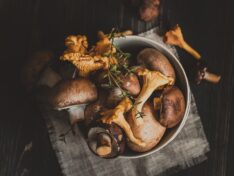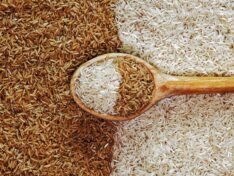Gut Health Research - All Roads Lead to the Stomach
Gut health research is prominent these days and proves that eating real food, mostly fruit and vegetables, is essential to maintain good health.

Gut health research is prominent these days -- your gut is your gastrointestinal tract. It starts at the mouth, continues through the esophagus (gullet), into the stomach, and then the intestines.
Your gut is home to bacteria that help break down food and absorb nutrients. Some bacteria have been called “good” bacteria because of their helpfulness with this digestion. Other bacteria have been deemed “bad” because they cause illness or weaken your immune system.
When your gut has a diverse population of bacteria, your gut is healthy. Conversely, sickness is caused when the “bad” bacteria runs rampant, and the population of “good” bacteria is depleted. Because of this newer research, many people are on a quest to feeding and aiding the environment that supports “good” bacteria.
All Roads Seem to Lead To The Gut
You know that feeling when you are suddenly terrified? You feel it in your gut. That feeling is when you are worried, and your stomach is in knots. It’s your gut.
Because scientists are finding more about your gut health, more research is being done, and new findings are happeningdailyy. Your gut is a huge, multi-functional system that we are finding plays a role in many health conditions, such as:
- heart disease
- weak immune system
- diarrhea or constipation
- auto-immune diseases
- acid reflux
- obesity
- skin conditions
- mental health disorders
- chronic sinus infections and asthma
- type II diabetes
- cancer
- Parkinson’s Disease
Correlation does not always mean causation -- so it’s still unclear whether an unhealthy gut flora causes these problems or if these conditions lead to unhealthy gut flora.
More Gut Health Research
This study (Abou-Donia, M.B. et al. Splenda alters gut microflora and increases intestinal p-glycoprotein and cytochrome p-450 in male rats. Journal of Toxicology and Environmental Health, Part A. 71 (21)) illustrates that sucralose-based sweeteners (like Splenda) can lead to the decrease in “good” gut bacteria.
This study by Brown, K. et al. Diet-Induced Dysbiosis of the Intestinal Microbiota and the Effects on Immunity and Disease. Nutrients. 4 (8) shows that sugar actually feeds and promotes the growth of the “bad” bacteria and “starves” the good bacteria, leading to an overgrowth of the undesirable bacteria in the gut.
This study by Dantzer, R. et al. From inflammation to sickness and depression: when the immune system subjugates the brain. Nature Reviews Neuroscience. 9 suggests that depression is actually the body’s reaction to inflammation in the gut.
What Can You Do?
Fiber tends to feed our healthy “good” gut bacteria. Unfortunately, highly processed and refined foods are notoriously lacking in fiber. This is why it’s essential to eliminate or severely reduce the number of processed foods, sugars, and artificial sweeteners in your daily eating habits.
The World Health Organization recommendsnot exceedingd 6 teaspoons of added sugar in your diet daily. However, food labels list sugar in grams, not teaspoons, on food labels. Most people do not know how to visualize grams, so here’s a tip:
*** Take the grams of sugar on your food label and divide it by 4 ***
That will convert the grams to teaspoons. Then you can easily visualize how much sugar is in that item. Better yet, avoid foods in packages altogether when possible. Fruits and vegetables naturally contain fiber that will feed your healthy gut bacteria and lead to a healthy gut biome).
Avoid words with “-ose” at the end -- they are sugars. Gut health research proves that sugar and sugar alcohols are not beneficial for our gut flora.
Fruit Has Fiber!
I still hear people always ask me if fruit has too much sugar and if should be avoided...?
I do not believe our problem with obesity is due to overeating fruit. If you are sensitive to fruit, by all means, cut back or cut it out of your daily eating habits.
Personally, I do not worry about the natural sugars in fruit and even enjoy making green juices. But it’s a common question.
Fruit has fiber, which slows digestion and gives your body time to pull the important nutrients from the food (it’s a nutrient-dense or nutrient-rich food source).
We are not getting fat from eating too much fruit, so we can stop worrying about it. A client recently told me she won’t eat kale because it’s a carbohydrate. We need to stop picking food for nutrient claims on packages and start looking at eating real, whole food.
Carbohydrates are not the enemy -- poor carbohydrates are the enemy.
Meal Basics
Gut health research proves that eating real food, mostly fruit, and vegetables, is essential to maintain good health. So, my final tip is to look at your meals a bit differently. Switch to a salad-size plate instead of a dinner plate. Fill half the plate with vegetables.
Eat a palm size of protein and a thumb size of healthy fat (avocado slices, olive oil, nuts, seeds, etc). This will work with any diet (vegan, vegetarian, Paleo, Mediterranean, etc.).
If there is any room left on your plate, you can fill it with a tiny portion of whatever you want.
Keep it simple and be consistent with good eating choices. It’s the long-term choices that affect your health the most.
Jessie Clayton
Jessie Clayton is a highly regarded yoga instructor (RYT 500) and certified nutritionist dedicated to guiding individuals on their journey to holistic well-being, with over 5 years of experience in yoga and nutrition. Jessie is an avid Christ follower and passionate advocate for the harmonious integration of mind, body, and spirit.














